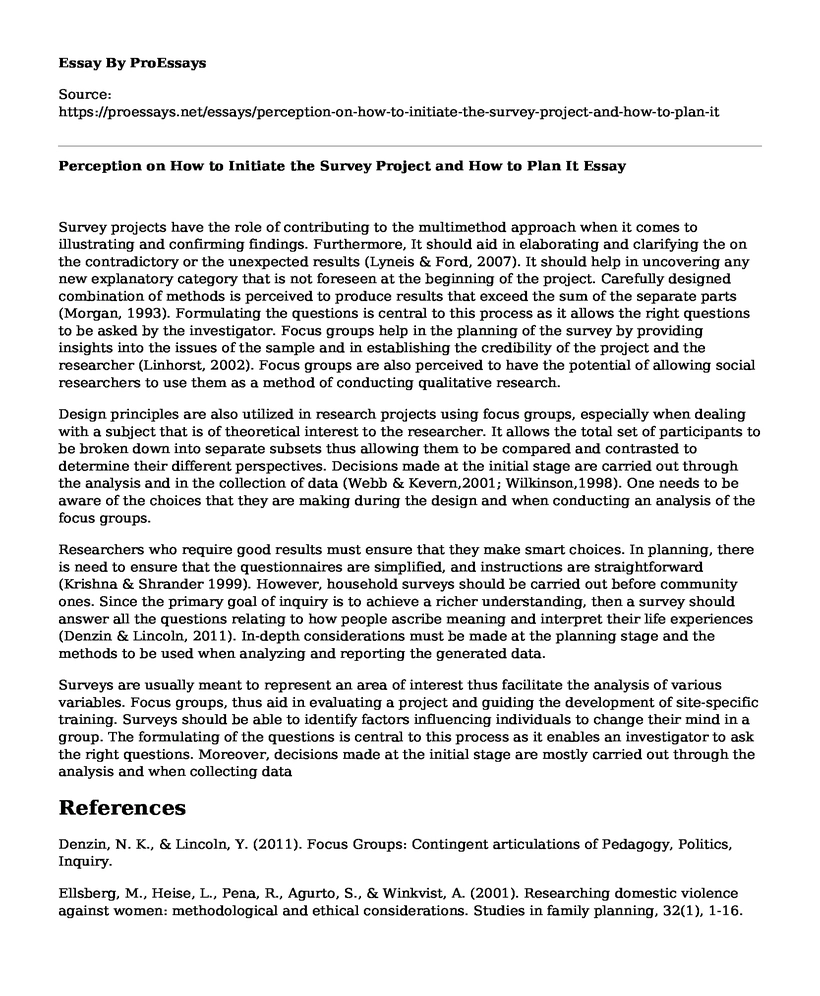Survey projects have the role of contributing to the multimethod approach when it comes to illustrating and confirming findings. Furthermore, It should aid in elaborating and clarifying the on the contradictory or the unexpected results (Lyneis & Ford, 2007). It should help in uncovering any new explanatory category that is not foreseen at the beginning of the project. Carefully designed combination of methods is perceived to produce results that exceed the sum of the separate parts (Morgan, 1993). Formulating the questions is central to this process as it allows the right questions to be asked by the investigator. Focus groups help in the planning of the survey by providing insights into the issues of the sample and in establishing the credibility of the project and the researcher (Linhorst, 2002). Focus groups are also perceived to have the potential of allowing social researchers to use them as a method of conducting qualitative research.
Design principles are also utilized in research projects using focus groups, especially when dealing with a subject that is of theoretical interest to the researcher. It allows the total set of participants to be broken down into separate subsets thus allowing them to be compared and contrasted to determine their different perspectives. Decisions made at the initial stage are carried out through the analysis and in the collection of data (Webb & Kevern,2001; Wilkinson,1998). One needs to be aware of the choices that they are making during the design and when conducting an analysis of the focus groups.
Researchers who require good results must ensure that they make smart choices. In planning, there is need to ensure that the questionnaires are simplified, and instructions are straightforward (Krishna & Shrander 1999). However, household surveys should be carried out before community ones. Since the primary goal of inquiry is to achieve a richer understanding, then a survey should answer all the questions relating to how people ascribe meaning and interpret their life experiences (Denzin & Lincoln, 2011). In-depth considerations must be made at the planning stage and the methods to be used when analyzing and reporting the generated data.
Surveys are usually meant to represent an area of interest thus facilitate the analysis of various variables. Focus groups, thus aid in evaluating a project and guiding the development of site-specific training. Surveys should be able to identify factors influencing individuals to change their mind in a group. The formulating of the questions is central to this process as it enables an investigator to ask the right questions. Moreover, decisions made at the initial stage are mostly carried out through the analysis and when collecting data
References
Denzin, N. K., & Lincoln, Y. (2011). Focus Groups: Contingent articulations of Pedagogy, Politics, Inquiry.
Ellsberg, M., Heise, L., Pena, R., Agurto, S., & Winkvist, A. (2001). Researching domestic violence against women: methodological and ethical considerations. Studies in family planning, 32(1), 1-16.
Franz, S., Zeh, A., Schablon, A., Kuhnert, S., & Nienhaus, A. (2010). Aggression and violence against health care workers in Germany-a cross sectional retrospective survey. BMC health services research, 10(1), 51.
Kitzinger, J. (1994). The methodology of focus groups: the importance of interaction between research participants. Sociology of health & illness, 16(1), 103-121.
Krishna, A., & Shrader, E. (1999, June). Social capital assessment tool. In Conference on social capital and poverty reduction (Vol. 2224).
Linhorst, D. M. (2002). A review of the use and potential of focus groups in social work research. Qualitative Social Work, 1(2), 208-228.
Lipscomb, J., McPhaul, K., Rosen, J., Brown, J. G., Choi, M., Soeken, K., ... & Porter, P. (2006). Violence prevention in the mental health setting: The New York state experience. CJNR (Canadian Journal of Nursing Research), 38(4), 96-117.
Lyneis, J. M., & Ford, D. N. (2007). System dynamics applied to project management: a survey, assessment, and directions for future research. System Dynamics Review, 23(23), 157-189.
Morgan, D. (Ed.). (1993). Successful focus groups: Advancing the state of the art (Vol. 156). Sage Publications.
Walrath, C. (2001). Evaluation of an inmate-run Alternatives to Violence Project: The impact of inmate-to-inmate intervention. Journal of Interpersonal Violence, 16(7), 697-711.
Webb, C., & Kevern, J. (2001). Focus groups as a research method: a critique of some aspects of their use in nursing research. Journal of advanced nursing, 33(6), 798-805.
Wilkinson, S. (1998, January). Focus groups in feminist research: Power, interaction, and the co-construction of meaning. In Women's studies international forum (Vol. 21, No. 1, pp. 111-125). Pergamon.
World Health Organization. (2001). Putting women first: ethical and safety recommendations for research on domestic violence against women.
Cite this page
Perception on How to Initiate the Survey Project and How to Plan It. (2022, Apr 04). Retrieved from https://proessays.net/essays/perception-on-how-to-initiate-the-survey-project-and-how-to-plan-it
If you are the original author of this essay and no longer wish to have it published on the ProEssays website, please click below to request its removal:
- Leadership Skill-Building Behavior Essay Example
- NewGen Case Study Paper Example
- Essay Sample on Leadership and Management Behaviors
- Strategic Alternatives to Diversification - Essay Sample
- What Does It Mean Being a Cheerleader Captain Essay
- Essay Sample on Strategic Management: Evaluating Operational Industry & Technology Trends
- Song Analysis Example: "Freedom" by Pharrell Williams







